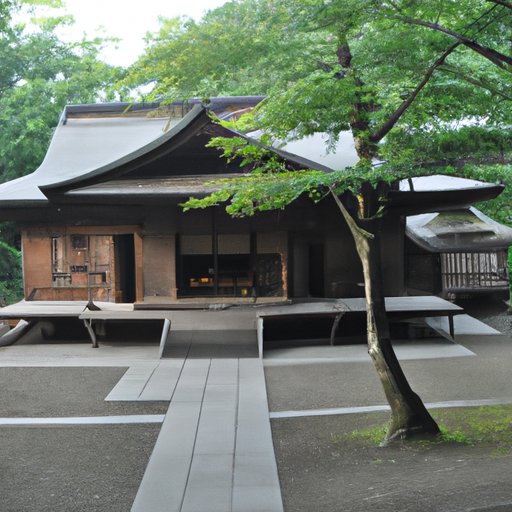Introduction
Japan is a country that has a rich and vibrant culture. From its ancient origins to its modern-day customs, there is much to learn about this fascinating nation. This article will explore the main aspects of Japanese culture, including its unique traditions, religious influences, traditional and contemporary cuisine, and art forms. We will also look at how these elements have evolved over time. By the end of this article, you should have a better understanding of what makes Japan an interesting and diverse culture.
Exploring Japan’s Rich Cultural Traditions
Japanese culture can be traced back thousands of years. It is believed that the Jomon period (14,000 – 300 BCE) was the first era in which a distinct culture began to emerge in Japan. During this time, the people of Japan were largely hunter-gatherers. Over time, the island nation developed its own language, religion, and other cultural practices. Today, many of these traditions are still practiced in modern-day Japan.
One of the most important aspects of Japanese culture is its respect for nature. This is evident in the reverence given to both living and nonliving things. For example, the concept of “wabi-sabi” is an aesthetic that celebrates the beauty of imperfection and transience. This appreciation of the natural world is deeply rooted in Japanese culture and can be seen in its architecture, art, and literature.
The traditional values of Japan are enshrined in the concept of “wa” or harmony. This is the idea that all things should be respected and treated with kindness. This includes the environment, animals, and even strangers. This value is reflected in the way the Japanese interact with one another and their commitment to preserving and protecting the natural environment.
How Religion Influences Japan’s Culture
Religion plays a large role in Japanese culture. Shintoism, Buddhism, and Confucianism are the three main religions practiced in Japan. Each religion has its own set of beliefs and rituals. For example, Shintoism focuses on ancestor worship and the belief in spirits called kami. Buddhism focuses on the teachings of Siddhartha Gautama while Confucianism emphasizes morality and ethics.
These religions have had a significant influence on Japanese culture. Many of the symbols, rituals, and customs associated with Japanese culture can be traced back to one of these three religions. For example, the Torii gate, a common symbol of Japanese culture, is often found at the entrance of a Shinto shrine. The practice of bowing as a form of greeting is also derived from Buddhism.
Investigating Japan’s Food Culture
Food is a major part of Japanese culture. Traditional Japanese cuisine is known for its emphasis on fresh ingredients and healthy eating habits. Popular dishes include sushi, tempura, ramen, and soba. These dishes are served in a variety of ways, from fast-food restaurants to high-end restaurants.
Japanese cuisine is not just about taste; it is also about health. Traditional Japanese dishes use ingredients such as seaweed, fish, and vegetables that are rich in vitamins and minerals. This type of diet has been linked to lower rates of heart disease, cancer, and other illnesses. Additionally, Japanese food is prepared in a way that minimizes waste and maximizes flavor.
Understanding the Role of Art in Japanese Culture
Art is an integral part of Japanese culture. Traditional Japanese art forms include calligraphy, painting, pottery, and origami. These art forms are often used to express emotion, depict scenes from nature, or simply create something beautiful. Contemporary art in Japan is heavily influenced by Western culture, but still retains its own unique style.
The art scene in Japan is vibrant and ever-changing. There are numerous galleries, museums, and festivals dedicated to promoting and celebrating the work of both traditional and contemporary artists. Whether it is a painting, sculpture, or installation, art in Japan is a reflection of the culture itself.
Conclusion
Japan is a country with a deep and fascinating culture. The nation has a rich history and its culture is defined by its traditions, religious influences, cuisine, and art. From its ancient origins to its modern-day customs, Japan is a culture that continues to evolve. Through this article, we have explored the main aspects of Japanese culture and gained a better understanding of what makes it unique.
From its appreciation of nature to its commitment to preserving tradition, Japan is a culture that is deeply rooted in its past. However, it is also a culture that is constantly adapting and evolving. Through its food, art, and other cultural practices, Japan has created a unique identity that sets it apart from the rest of the world.
Final Thoughts on Japan’s Culture
Japan is a country with a culture that is both ancient and modern. Its traditions and customs are deeply rooted in its past, but it is also a culture that is constantly adapting and changing. From its religious influences to its art and cuisine, Japan is a nation that offers a unique perspective on the world.
(Note: Is this article not meeting your expectations? Do you have knowledge or insights to share? Unlock new opportunities and expand your reach by joining our authors team. Click Registration to join us and share your expertise with our readers.)
